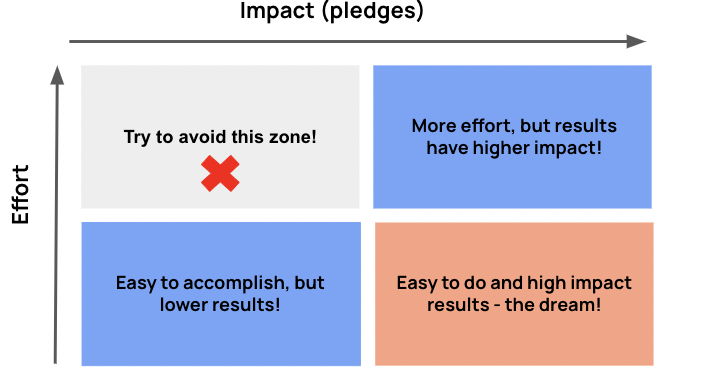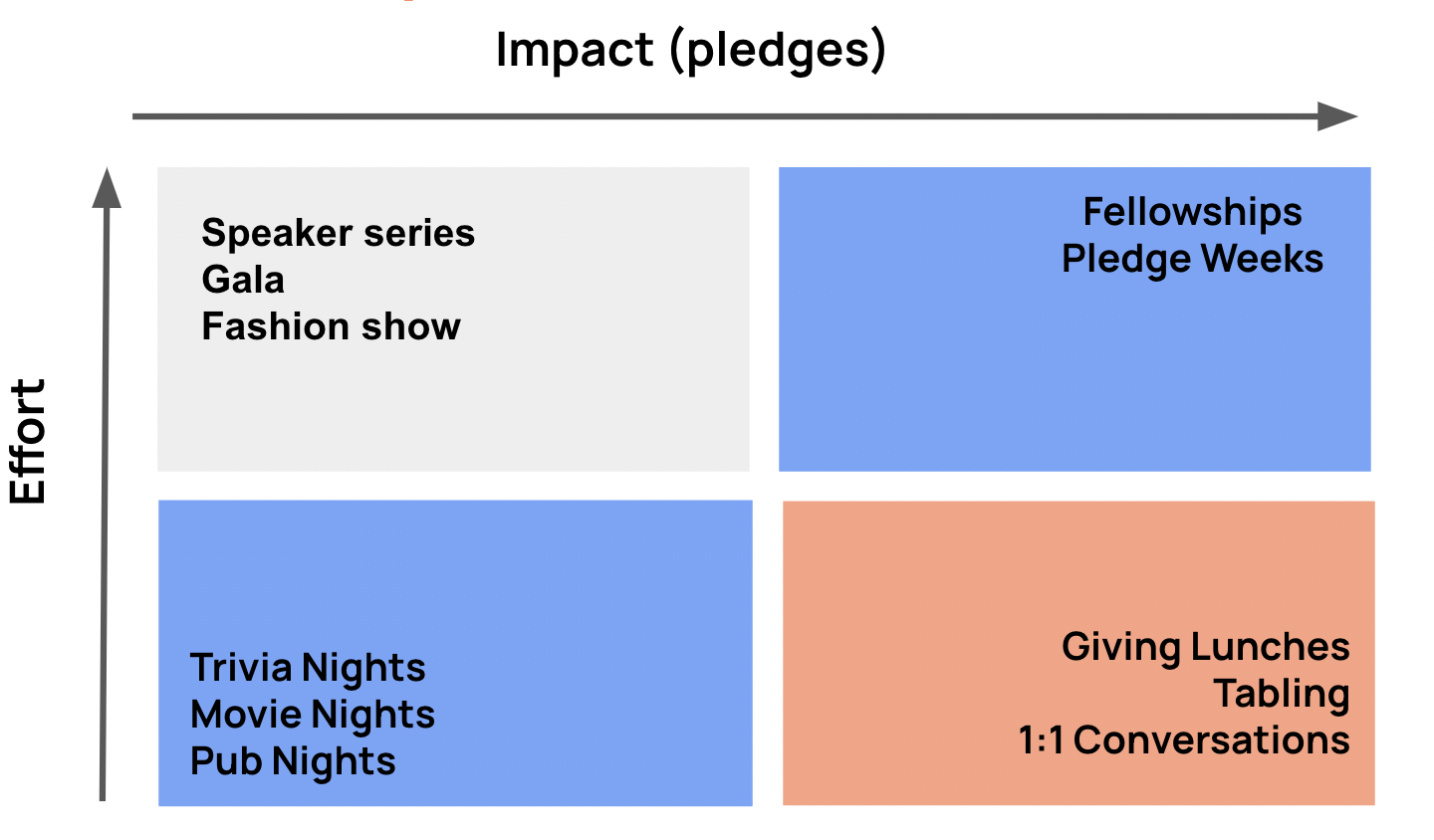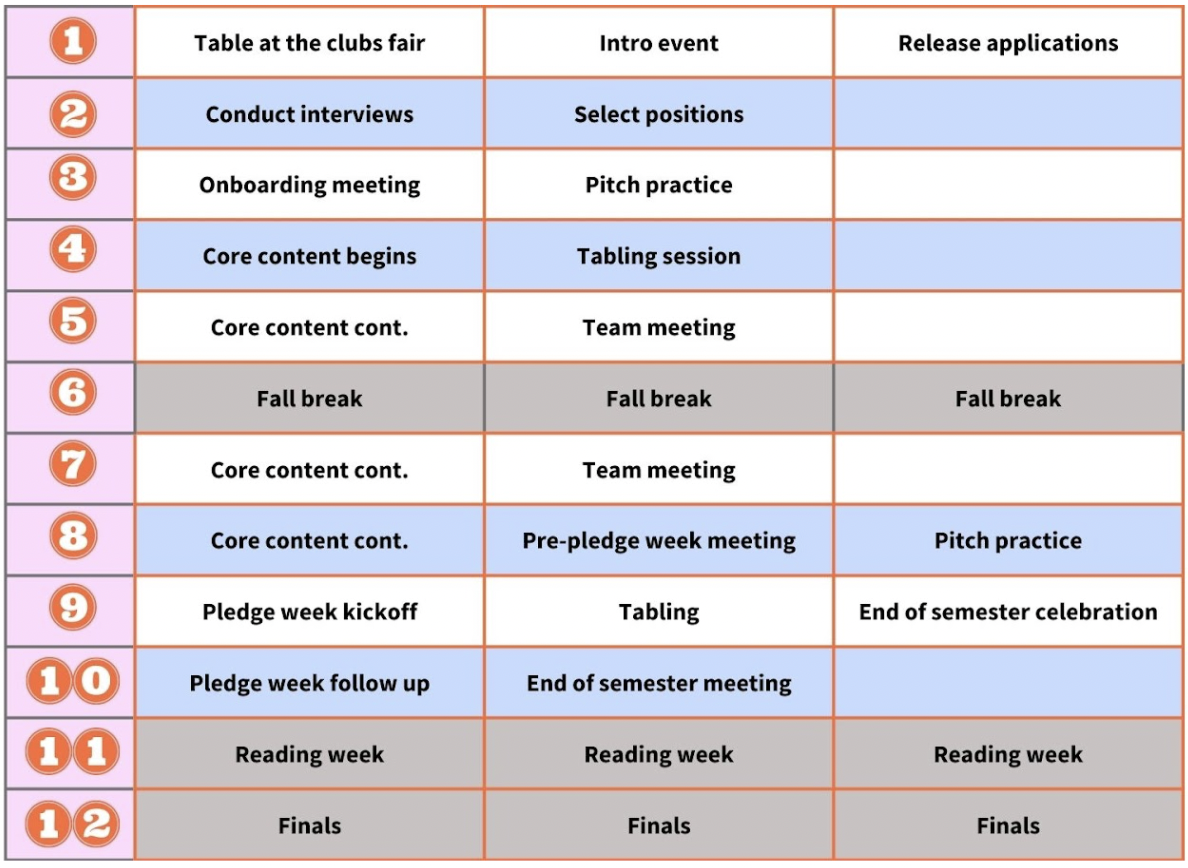Running a OFTW chapter is a bit like a choose-your-own-adventure story. But instead of mixing and matching plot points to produce a narrative of dubious quality, you can pick and choose different strategic approaches and tactics to maximize your chapter's impact.
In this article, you will find guidance and resources for three types of OFTW semesters you could choose to run based on your capacity. Remember, the more time you invest in running your chapter, the more pledges you will recruit, and the more unnecessary suffering you will be able to prevent.
Contents:
- What is a semester plan, and why make one?
- Before you start: 4 key considerations
- Sample semester plan
- Key Resources and Guides
What is a semester plan & why make one?
The only goal of your chapter is to get as many people as possible to take the pledge.
Semester plans allow you to maximize the time you have in a given semester, to get as many pledges as possible and improve the lives of more people living in extreme poverty.
The #1 feedback we hear from chapter leaders is that they wish they had started planning earlier. You do not want to reach the end of the semester and feel that your chapter did not reach its full potential. Having a plan also allows you to account for periods in the semester when you will likely be less productive (due to midterms, spring break, etc.) so that you can avoid burnout or unnecessary added stress.
Before you start: 4 key considerations
Before you begin to make your plan, there are four important factors that should be accounted for.
Journey to pledge

The average person you speak to will not take the pledge the first time they hear about OFTW. You will need to establish a clear journey of engagement so that they have multiple opportunities learn about effective giving before they are ready to pledge.
- Consider a friend who hasn’t pledged -- What ‘points of engagement’ will prepare them to pledge? How will you draw them in to those points of engagement?
- Then, scale this up to the entire chapter, and build these ‘points of engagement’ out to multiple events / vectors of outreach that your members can drive turnout to.
This is the lens through which you decide what activities should be included in your plan, and when to schedule them.
Team Capacity

Given the size of your current team, what can you reasonably achieve in a semester (~4 months)?
- You must consider this when making your plan. If you are over ambitious, you risk half-assing every event or dropping the ball on follow through. Instead, you should scale back operations and focus on a few pieces of programming that you can execute perfectly.
- Likewise, if a member of your team is applying to med school this semester and is part of three other clubs, do not put them in charge of pledge week! Instead, ask them to help with a few tabling sessions or run a giving lunch.
Effort v.s. Impact

Some programming is much more worthwhile than others! You are a busy student and you have a lot going on, so we want to ensure that the time you devote to OFTW actually results in people taking the pledge.
- Aim for activities that are high impact, and make sure that you have the time capacity to put in the effort that is required to pull them off!
Here are some examples of activities that fall into each of these categories:

Important Dates
Remember to check your school's academic calendar, as well as the OFTW HQ events calendar before choosing dates for your semester plan. You may want your semester activities to coincide with HQ training sessions.
For example, you can bring your new members to our pitch practice workshop, but only if they have been recruited and onboarded before that date!
- Pledge week should be at least two weeks before finals
- Factor in break times for yourself and your team (spring break, reading week, etc.)
- Take advantage of more free time early in the semester!
Example semester plan

This is one example of how to make the most of 12 weeks in a semester. Below you will find all the key steps to a successful semester, with corresponding links to a page of this hub where you can learn more!
Steps to success:
- Recruit new members
- Onboard new members and run a conversation practice
- Run regular team meetings to keep your team engaged and accountable
- Begin core content (Outreach, Advocacy program, Tabling and Events) to help people learn about the pledge
- Run a pledge week and get everyone in your pipeline to take the pledge
- Have an end of semester meeting to confirm engagement for the next semester and celebrate your success!
- If you are not planning to lead the chapter next year, begin the leadership transition process.
Semester planning worksheet (Use this to make your semester plan - then submit this to your chapter manager for review)
Semester planning toolkit - an index of our best resources for each component of your semester
Foundational semester checklist